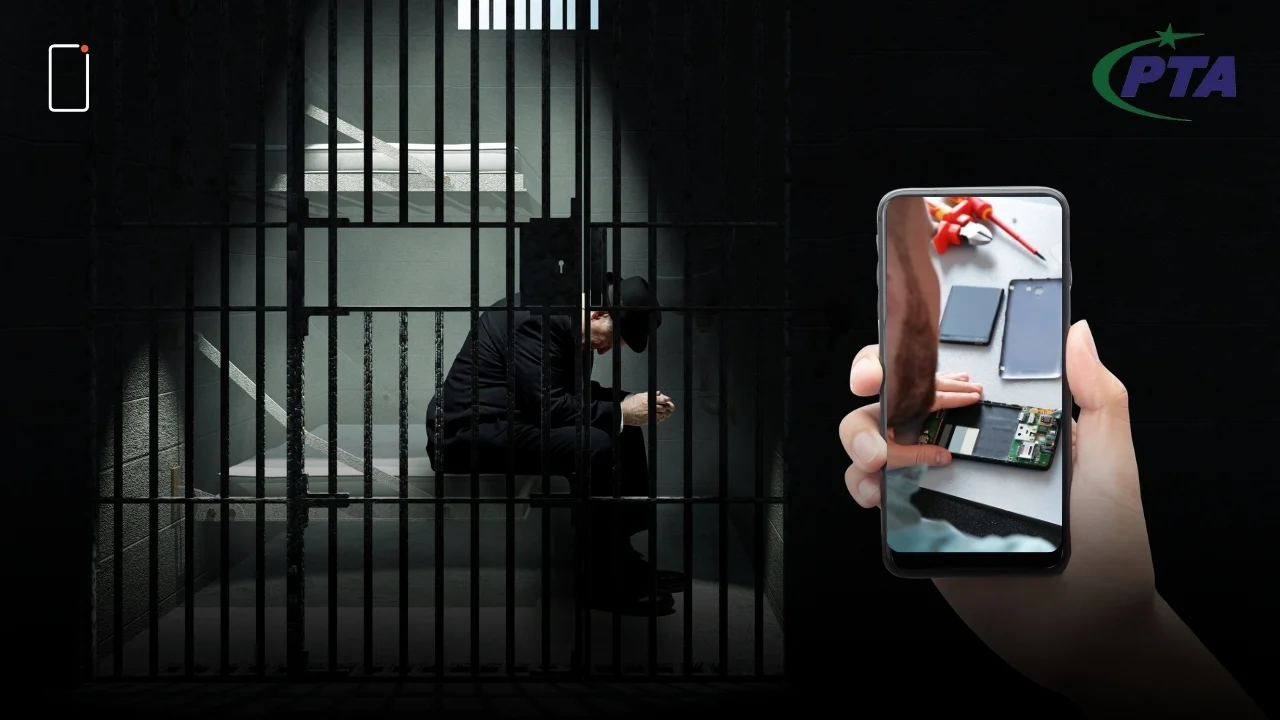The Pakistan Telecommunication Authority (PTA) has issued a new warning about people using illegal or modified mobile phones. The PTA says anyone caught with these phones could face up to three years in prison, a fine of up to Rs. 1 million, or have their device taken away. The focus is on phones with fake or altered IMEI numbers. This announcement has led to a lot of outrage on social media. Many users have flooded platforms like Facebook with complaints and questions.
On TechJuice and PTA’s official pages, the reactions were strong. People seemed angry, frustrated, and tired of the situation.
One user, Zeeshan Khalid, wrote:
“They failed to stop patched mobiles. Why penalties now?”
Another user, Syed Mubarak Abbas, questioned the point of paying taxes:
“Are we getting better healthcare or education? No. Then why keep squeezing the public?”
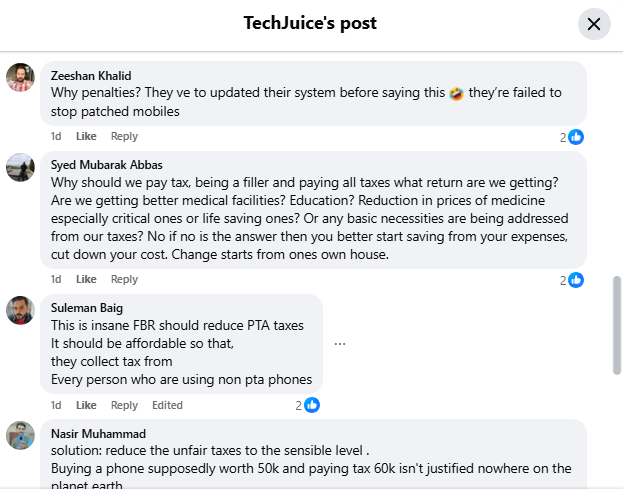
Many believe the government is punishing the wrong group. Instead of targeting smugglers or black-market dealers, they are going after regular users. Most buyers don’t even know their phones are illegal or have fake IMEIs.
High Taxes Add to the Problem
A large number of users also pointed out the high taxes on smartphones. These taxes often make it impossible to afford a good phone. One comment said that a phone worth Rs. 50,000 ends up costing Rs. 110,000 after taxes. Sometimes, taxes are even higher than the phone’s price.
“Buying a 4-lac phone and paying over 1.76 lac in taxes? Where’s the justice?” asked Muhammad Salar Abbasi.
Others shared similar views. They say the high cost forces people to look for cheaper, unofficial alternatives. It’s a matter of survival, not luxury.
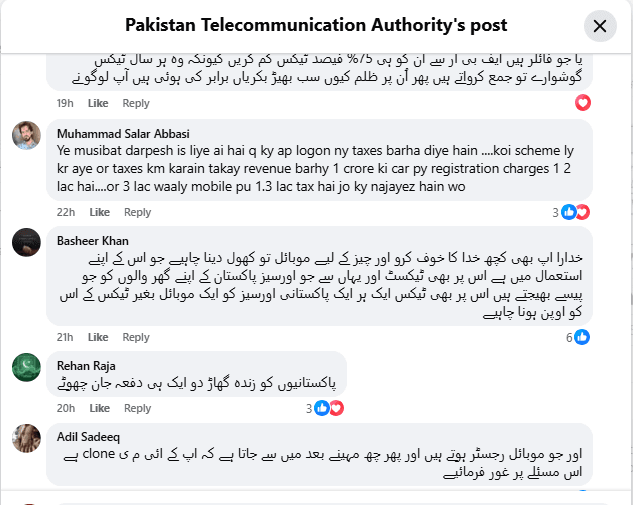
Syed Huzaifa Ali wrote:
“Even 100k phones are potatoes in specs. Why not buy a 30k patched phone that performs better?”
Retailers Also Affected
Retailers have also spoken up. Some say they buy phones in bulk with PTA stickers that show they are approved. These phones are sealed and ready to sell. But after a few months, these phones suddenly become blocked. This has happened with brands like Infinix, Tecno, and Itel.
Abdul Qudoos Khan said, “We spend millions on phones that are sealed and PTA-approved. Then, out of nowhere, they get blocked. Why?” Such issues hurt business and make people lose trust in the system.
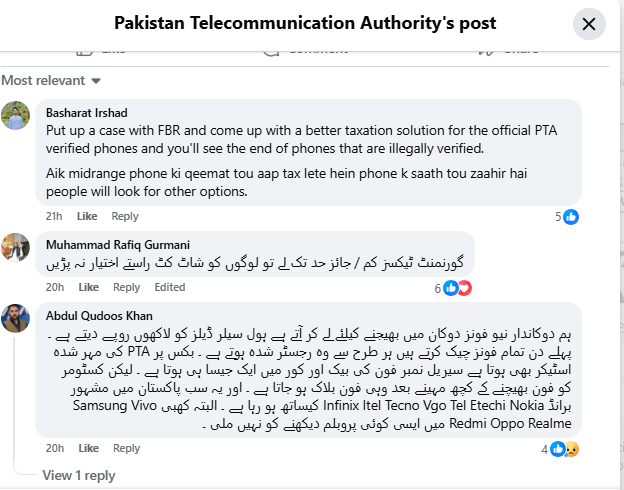
Comparing with Other Countries
Many social media users also questioned why Pakistan has this kind of phone system at all. They point out that most countries don’t have mobile registration rules. India, for example, doesn’t require IMEI registration like PTA does. Even some African countries don’t ask for this. People just insert a SIM card and start using their phones.
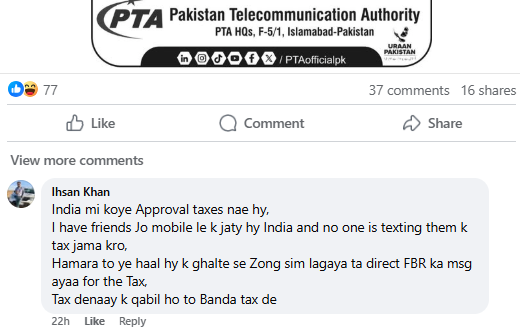
Another person added:
“Even in the world’s poorest nations, no one pays such taxes to use a mobile phone.”
This raises a serious question. Is this really about regulation, or just another way to collect more money from the public?
PTA’s Justification
PTA argues that the system helps keep the country safe. They say fake IMEI numbers can be used for crimes. Blocking such phones is meant to protect the public. But critics argue the costs are unfair. They say it’s wrong to punish users who unknowingly buy illegal phones.
Who Should Be Accountable?
Instead of warning common users, many say authorities should target sellers, smugglers, and importers. These are the people bringing illegal phones into the market.
“Why are users being arrested? Arrest the dealers,” Bilal Karim said angrily.
Hurrair Aqeel called it daylight robbery, saying, “PTA knows the grey market exists. Yet they don’t fix it. They just go after regular people.”
The demand is simple: make phones affordable, fix the tax laws, and target those who break the rules.
Is This Justice?
When people pay more than double the phone’s price just to stay legal, something is wrong. When people are fined for phones they didn’t know were illegal, something is wrong. When honest retailers suffer despite buying approved stock, something is wrong.
Regulations should protect users, not punish them. A fair system supports people, not drains their cash. Pakistan needs better solutions, not threats. Smugglers must be stopped at the source. Taxes need to be fair. The process should be clear and open.
Until then, the question remains: is this justice or just a new way to make people pay?
For more daily updates, please visit our News Section.

